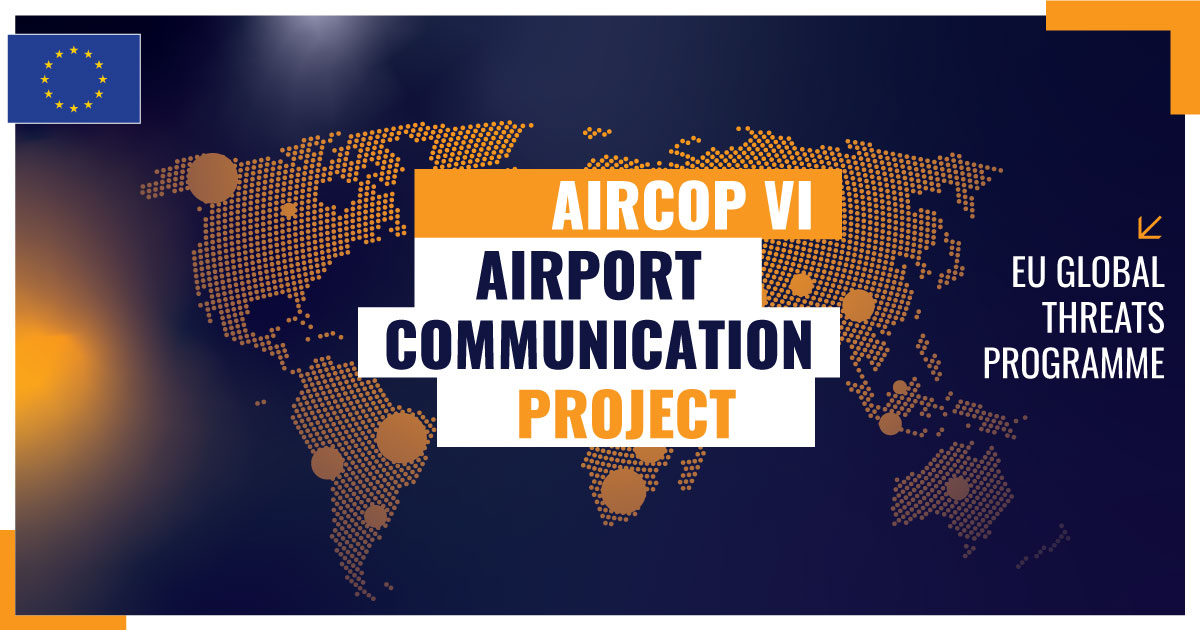
Context
Organised crime groups have a key interest in speeding up transportation of drugs and other illicit goods, employing ships, containers or aircraft. Today, they are able to transport ever larger amounts of drugs and illicit goods across the globe. The increasing flow of air travellers and growing connectivity offered by airlines are opportunities for illicit traffickers. In Africa, Latin American, the Caribbean and Southeast Asia, airports often lack capacity and resources to conduct controls, resulting in limited targeting, inspections of shipments and luggage and body checks. As cocaine and other illicit goods may be moved several times before being eventually shipped to their final destination, law enforcement agencies could obtain crucial information during this process. The Airport Communication Project (AIRCOP) was launched to combat all forms of illicit trafficking by air and to strengthen interdiction capacities at selected international airports through the establishment of Joint Airport Interdiction Task Forces (JAITFs) to enable real-time exchange of operational information with other airports globally and enhance capabilities of national law enforcement authorities to detect and intercept high-risk passengers.
Overall objective
AIRCOP aims to strengthen the capacities of international airports to detect and intercept drugs, other illicit goods and high-risk passengers and to share real-time operational information between origin, transit and destination countries to disrupt cross-border illicit flows and criminal networks.
Specific objectives
- To build, consolidate and strengthen interdiction capacities of JAITF (Joint Airport Interdiction Task Forces) at selected international airports in Africa, Latin America, the Caribbean and South-East Asia.
- To facilitate real-time transmission of operational information at regional and transregional levels, including through connection to international law enforcement databases, as well as with law enforcement counterparts at airports in the EU, building long-term formal and informal cooperation.
Concrete activities
- Investigative interviewing, and evidence management for high-risk passengers and air cargo training sessions, and AIRCOP Virtual Forums in English, French and Spanish.
- Mentoring missions and specialised training on abnormal behaviour identification and operational response in Argentina and Paraguay.
- Procurement of IT, inspection, and protection equipment for JAITFs in Argentina, Bolivia, Paraguay, San Salvador, Dominican Republic (Las Americas and Punta Cana airports); prepared for further delivery once JAITFs in Mozambique and Ethiopia are operational.
- Continued focus on the establishment and operationalisation of JAITFs through assessment and strategic missions to Ethiopia, Mozambique, Cambodia and Paraguay supporting legal frameworks revisions.
- Project duration
- 1 May 2022 - 1 May 2026
- Project locations
- AngolaArgentinaBarbadosBeninBoliviaBrazilBurkina FasoCabo VerdeCambodiaCameroonChadColombiaCôte d’IvoireDominican RepublicEcuadorEl SalvadorEthiopiaThe GambiaGhanaGuinea-BissauJamaicaKenyaMaliMoroccoMozambiqueNigerNigeriaPanamaParaguayPeruSenegalSouth AfricaTogo
- Overall budget
- €10 000 000
- Threat area
- Fight against Organised Crime
Results
- Expansion of JAITFs with 28 units operational and more underway, driven by growing demand and scale-up at high-risk airports, alongside an expanded mandate to tackle trafficking in minerals, wildlife, and falsified medical products, supported by improved technology for risk assessment and profiling.
- Delivery of 675 training and mentoring sessions, enhancing the expertise of law enforcement officials, alongside implementation of best practice exchange programmes to fostering inter-regional cooperation.
- Facilitation of interregional fora and dialogues to improve intelligence-sharing and coordination and strengthened institutional frameworks to support long-term sustainability, with a strong focus on the Latin America and the Caribbean to West and Central Africa route.
- Support to the participation of JAITFs to 58 joint operations across regions, leading to increased seizures of illicit goods and strengthened intelligence-sharing and coordination among police, customs, and relevant law enforcement and partner agencies active at the airport platform, as well as enhanced collaboration with international partners like INTERPOL and WCO through platforms such as I-24/7 and CENcomm.
Achievements
- The JAITFs supported by AIRCOP have carried out over 6,016 arrests and 6,770 seizures in passenger and cargo areas at airports, significantly disrupting criminal activities and enhancing security. Beyond seizures, the JAITFs and their inter-agency model have become integral components of national security frameworks in participating countries.
Seizures include: Narcotics: 17.8 tons of cocaine, 7.5 tons of cannabis, 2.5 tons of psychotropic substances , 6.1 tons of synthetic opioids, 3.5 tons of khat, 740 kg of heroin and 1.1 ton of precursors; Falsified medical products: 13 tons of falsified and counterfeit human medicine; Weapons and explosives: 5,472 pieces of ammunition and 225 pieces of firearms; CITES-prohibited items: 34 kg of cachalot, 582 kg of ivory, 1.3 tons of pangolin, 354.7 kg of sea cucumbers, 355 kg of shark fins, 3 kg of shark teeth, 8 kg of crocodile skin, 9 kg of snakeskin, 2.2 kg of ebony wood, 3.3 kg of fossils, 868 parrots, 35 monkeys, 9 hippocamps and 6 wild birds; Fraudulent or stolen documents: 32 pieces of debit cards, 360 pieces of passports, 44 pieces of residence permits, 170 pieces of visas and 159 pieces of other documents. Minerals: 184 kg of gold, 20.1 kg of silver and 3 diamonds; Tax and duty evasion: 4.4 tonnes of tobacco and 845 seizures of undeclared goods (miscellaneous); Undeclared cash: 21,7 million USD; Other restrictions and prohibitions: 135 mobile phones, 1,666 SIM cards, 239 liters of alcoholic beverages, 22 pieces related to Intellectual Property Rights and 21 other seizures; High-risk individuals: 9 possible foreign terrorist fighters, 23 INTERPOL/FBI wanted persons, 56 potential perpetrators of trafficking in persons or smuggling of migrants and 43 victims of human trafficking.
